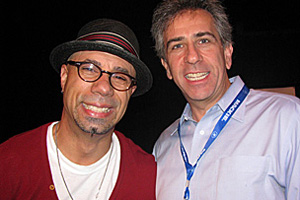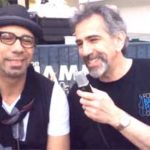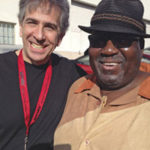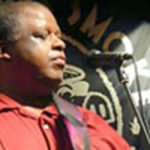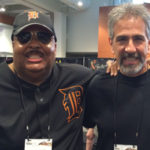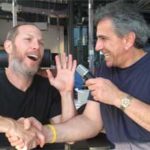Puerto Rican funkmeister talks to FBPO about breaking into the LA music scene, the Spyro Gyra gig, current recording projects and more
Exclusive interview with FBPO’s Jon Liebman
April 30, 2012
Oskar Cartaya is a bassist, composer, arranger and producer, based in Los Angeles. In addition to touring and recording with Spyro Gyra for five years, Oskar has also worked with Herb Alpert, Joe Sample, Alex Acuña, Jennifer Lopez, Willie Colón, Tito Puente, Steve Lukather, Tania Maria, Robbie Robertson, Tito Puente, Steve Winwood, Arturo Sandoval, Regina Carter, Kirk Whalum, Randy Brecker and countless others. Oskar is a consultant on Nickelodeon’s upcoming series, How To Rock. He is also working on a new solo CD with his band Enclave.
FBPO: How would you describe you musical upbringing?
OC: I was blessed to grow up in an environment where music was the center of pretty much everything. Coming from a non-musical family, no one before me had any adventures down this road. I had all the support anyone can dream off! I told my father at age 10 that one day, “I’m gonna be a musician.” He was reading a newspaper, looked at me and said, “Fine.” Until the day he passed away, he was my biggest fan. From classical to latin and everything in between, that was my experience growing up.
FBPO: What kind of gigs were you doing in Puerto Rico?
OC: I went to a performing arts school and I played in every possible situation, from youth symphony orchestra, jazz band, chamber orchestra, contemporary music group and so on. At age 15, I started doing all kinds of gigs, from salsa bands to local pop artists. By he time I left the island at age 18, I was a working musician.
FBPO: Tell me about your experience at the Musicians Institute.
OC: My time there is considered the “Golden Age” of MI. Frank Gambale was one of my classmates and Scott Henderson had just graduated. We would play non-stop, from the moment school opened until they kicked us out!
 FBPO: How did you manage to break into the LA music scene, despite the fierce competition?
FBPO: How did you manage to break into the LA music scene, despite the fierce competition?
OC: When people in Puerto Rico started to find out I was going to LA, they kept telling me to contact Alex Acuña when I got there. Alex lived in Puerto Rico for about ten years, so he knew a lot of the people I had been working with. One day Alex came to MI to teach and I asked him if I could sit in his class. We started playing and afterwards he asked me where I was from. I told him and, next thing I knew, he recommended me to Justo Almario, who, throughout the years, I have called my “Musical Godfather.” I ended up replacing some guy in Justo’s band named John Patitucci! [Laughs]
FBPO: Can you identify a turning point, a defining moment, when you realized you were definitely going to have a career in music?
OC: Yes. Since I was 10 years old, I knew in my heart that I wanted to do music forever. In my senior year of high school, I made enough money in two months to by my father’s car. At that point, I had a pretty good idea this was going to work out.
FBPO: What advice do you have for someone looking to make a similar move today to LA, New York, Nashville, etc.? The scene is so different now than when you first arrived.
OC: Everything has changed so much in last two decades, but one thing that will never change is the importance of meeting people and connecting with others. Play with as many people as possible, go to jam sessions, help people with their demos. It will all come together at some point.
FBPO: You had a pretty good run with Spyro Gyra. What can you tell me about that gig? How did you get it?
OC: I had a great time with that band! I spent five years with them, playing around the world, recording and everything else. I had been in New York City for around four years when Kim Stone, the bass player at the time, left the band. They were having auditions and I got a call asking me if I was interested. I really prepared for that audition. Two days later, they called and told me it was down to another bass player and me and they chose the other guy. I was disappointed, but moved on. Then I heard a few months later that the bass player they chose didn’t work out. Next year, around the same time, they called to ask me if I would like to come down and audition again. I almost said no, but I put my ego aside and went down. The rest, as they say, is history.

With FBPO’s Jon Liebman Bass Player Live! October 2011
FBPO: Tell me about your new recording with Enclave. Who will be on it? When will it be released?
OC: I’m once again in the process of trying to get a CD completed. I’m very excited because I’m trying to pick up where I left off with my first one (My Music, My Friends, My Time). I have an array of people with whom I want to collaborate on this project, so it’s all about timing and luck to make it happen. Hopefully by the end of the summer it will be done.
FBPO: What kind of basses do you play?
OC: I have had several Sadowsky basses throughout the years. Right now I have two Sadowsky Metros, a maple/ash and an alder/rosewood, besides my first Sadowsky.
FBPO: What do you like about Sadowsky basses?
OC: I have known Roger (Sadowsky) since 1983. He first did work on a bass I had when I was still a student at MI. When I moved to New York in 1984, I became a regular at his shop. In 1989, he offered me an endorsement and taught me a very valuable lesson: He told me, “I’m not going to build you a bass; I build basses every week. Just come by and play my basses and when you find the one that speaks to you, that will be your bass.” Ever since then, I have been playing that heavy black maple/ash bass.
For years, my colleagues have been complimenting me on the sound of the instrument. Roger has been a great friend and supporter and his basses have become an integral part of my sound.
FBPO: What else is keeping you busy these days?
OC: Besides fatherhood?! I little bit of everything. I’ve been working for different shows for Nickelodeon. I’m also contributing to a project called Playing For Change, which is a very cool project. Recording, writing and producing keeps me busy.
FBPO: What lies ahead for you and your career? What else would you like to do that you haven’t accomplished yet?
OC: I really don’t have one specific goal that I can say, “This is what I want to do.” Yes, I would like to tour with my band or maybe join a TV house band. I don’t have one specific thing, but I’m completely open to what the future may bring.
FBPO: What would you be if you weren’t a bass player?
OC: I would have loved to be an athlete. As a kid, the only two things I always wanted to be were a Yankee or a musician.
Also see our exclusive FBPO interview with
John Patitucci, who is mentioned here:
